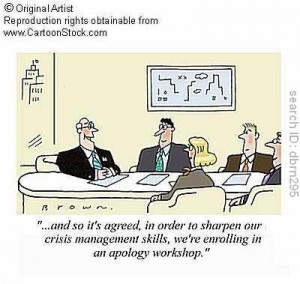 So Susan G. Komen caved to pressure and reversed the decision to not fund Planned Parenthood.
So Susan G. Komen caved to pressure and reversed the decision to not fund Planned Parenthood.
Fantastic!
Or is it?
Did they cave because of the outcry, both online and off?
Or did they cave because they were caught not applying their “we don’t fund organizations under investigation” rule across the board (Penn State receives funding and Bank of America is a major sponsor – both under investigation)?
It doesn’t matter how you feel about the entire situation. If this were a political blog, it would matter. But it’s not. So we’ll talk communication instead.
What does matter on Spin Sucks is the incredible PR crisis management case study it’s providing.
During my research for this blog post, I discovered a few things:
- Susan G. Komen has a consumer PR agency.
- Susan G. Komen has a crisis management agency.
- The crisis management agency for Susan G. Komen and Planned Parenthood are one and the same.
Let’s put aside the third thing for now (talk about a situation that became a huge conflict of interest last week!) and focus on the fact that Komen hired their crisis management firm last summer.
They were hired to “monitor media, support speaker programs, and provide issues counsel around controversial topics that could affect the organization, such as Komen’s position on embryonic-stem-cell research.”
So, then, let’s assume because the decision to stop funding Planned Parenthood is policy and not an “issue,” they likely weren’t asked to create scenarios in which things could go very wrong.
Until last Tuesday, when things went very wrong.
The Atlantic spoke with John Hammarley, who until recently served as Komen’s senior communications adviser and who was charged with managing the public-relations aspects of Komen’s Planned Parenthood grant.
“About a year ago, a small group of people got together inside the organization to talk about what the options were, what would be the ramifications of staying the course, or of telling our affiliates they can’t fund Planned Parenthood, or something in between.” He went on, “As we looked at the ramifications of ceasing all funding, we felt it would be worse from a practical standpoint, from a public-relations standpoint, and from a mission standpoint. The mission standpoint is, ‘How could we abandon our commitment to the screening work done by Planned Parenthood?'” But the Komen board made the decision despite the recommendation of the organization’s professional staff to keep funding Planned Parenthood.
They’ve been thinking about this decision for a year.
The PR firm they hired to “monitor media, support speaker programs, and provide issues counsel” is very experienced.
Had they been asked, when they were hired, to provide counsel on what could happen if they decided to defund Planned Parenthood, they would have held several meetings in which they would play out every, single consequence that could be created by a decision like this. They would advise on several different options (perhaps slowly taking away the funding?). And they would have experience with the social web and knowing what would trigger an uproar. A year is plenty of time to manage the messaging and hold a crisis at bay.
People make mistakes. We’re all human beings. But looping in you PR counsel after hundreds, if not thousands, of people are commenting on your Facebook wall and YouTube channel (which you’re deleting) and every major news outlet is writing about you is a very, very bad idea.
In fact, if they’d brought in their PR counsel on this policy change, they would have had a strategy around their decision, they would have had their messaging set (instead of changing it at least three times in three days), and they would not have had to reverse the plan because of public outcry.
This was all completely avoidable.
Good PR counsel and a crisis management plan is like insurance…you have to have it.
In the past, a decision like this would have created some protests, but Susan G. Komen would have been able to control it. Today, that’s not an option. The social web provides people a bullhorn and they use it.
You can no longer pretend you won’t be affected by upset stakeholders. You are no longer in control. Your customers control everything, from your brand to who buys from you.
Be prepared. Get yourself crisis insurance with an experienced PR firm or professional.